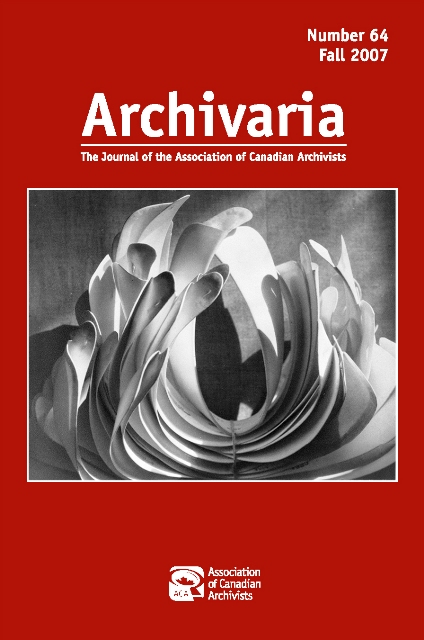Recordkeeping Professional Ethics and their Application
Abstract
This article examines the concept of codes of ethics for archivists and recordkeepers as a work in-progress. It begins with a short review of an area now undergoing significant theoretical and practical development, the association between ethical recordkeeping and human rights, particularly at the international level. This is followed by a more detailed analysis of archival codes of ethics from several Anglophone and Francophone countries, as well as that of the International Council on Archives (ICA) and of ARMA International. It is suggested that the discrepancies between such national codes are at least partly owing to their lack of connection to a wider societal context. It is also suggested that this lacuna – and the confusion in some as to precisely what audience is being addressed – weakens them; if codes of ethics appear to apply only to a narrow group of professionals and a limited range of issues, they risk becoming unconnected to larger concerns and thus irrelevant to the wider society. The next section consists of three case studies addressing recordkeeping and real-life ethical situations, and asks whether the application of current codes of archival ethics would have made a difference to the outcome. The article concludes by offering some possible future developments for archival codes of ethics.
RÉSUMÉ
Cet article examine le concept du code d’éthique pour les archivistes et les gestionnaires de documents comme un travail en cours. Il fournit d’abord un court aperçu d’un domaine qui connaît présentement des développements théoriques et pratiques importants : le lien entre la gestion éthique des documents et les droits humains, surtout à l’échelle internationale. Il donne ensuite une analyse plus détaillée des codes d’éthique des archives de plusieurs pays anglophones et francophones, ainsi que du Conseil international des archives (ICA) et de ARMA International. L’auteure suggère que les écarts entre ces codes nationaux peuvent s’expliquer, au moins en partie, par l’absence de lien avec un contexte sociétal plus vaste. Elle suggère aussi que cette lacune – et la confusion pour certains de savoir quel public exact est visé – les affaiblit : si les codes d’éthique ne semblent s’appliquer qu’à un petit groupe de professionnels et à une gamme de questions assez restreinte, ils risquent de devenir détachés des questions plus larges, et donc de cesser d’être pertinents à l’ensemble de la société. La prochaine section de l’article comprend trois études de cas portant sur la gestion des documents et des situations éthiques réelles, puis elle examine si l’application des codes d’éthique des archives actuels aurait pu influer sur les résultats obtenus. L’article termine en imaginant quelques développements futurs pour les codes d’éthique des archives.
Authors of manuscripts accepted for publication retain copyright in their work. They are required to sign the Agreement on Authors' Rights and Responsibilities that permits Archivaria to publish and disseminate the work in print and electronically. In the same agreement, authors are required to confirm that "the material submitted for publication in Archivaria, both in its paper and electronic versions, including reproductions of other works (e.g. photographs, maps, etc.) does not infringe upon any existing copyright." Authors of manuscripts accepted for publication retain copyright in their work and are able to publish their articles in institutional repositories or elsewhere as long as the piece is posted after its original appearance on archivaria.ca. Any reproduction within one year following the date of this agreement requires the permission of the General Editor.





